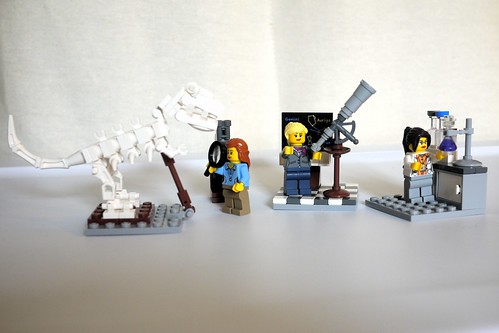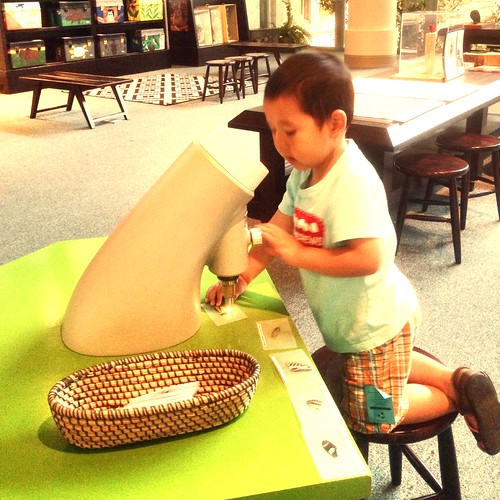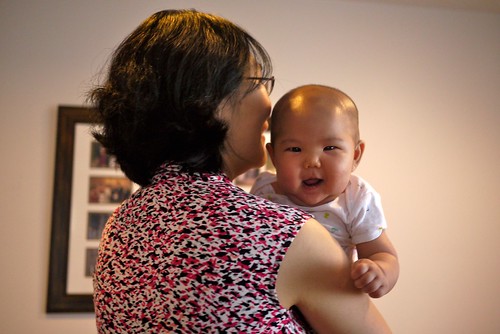 |
| LEGO Research Institute set |
Another goal is most strongly made from the superhero genre. Fantasy play provides those who usually have no power (children) an experience where they have agency, the ability for their choices and actions to have an impact on their world. And as there are clear boundaries that authority figures have put into the lives of pre-schoolers, being able to identify with an actor in a fantasy world allows them to think and play where their boundaries and capabilities are much greater than reality. (Disney's Frozen really is blatant about this in the song "Let it go")
So there are two things that I want when my son interacts with pop culture fantasy. First, that it is a vehicle for talking about what is right or wrong and promoting empathy, second that it teaches agency and competence.
For the first, we can follow the standard good guy-bad guy play of boys. And as he plays, we can interject with questions about why a character in his play did what they did. What is good and bad, nice and not-nice. And we can steer his play through our questions. So one day, when a bad LEGO character was part of the play and we thought about how everyone reacts, he had all of the good LEGO minifigs got together to push the bad guy away (he knows about super heroes, but I don't think he has gotten the idea that super heroes are anything special, so he needs to use numbers to be on the good guys side). Playing with Star Wars space ships turned into them being fire-fighting space ships.
| LEGO Star Wars Brickmaster Ice Speeder, assembled by T |
For agency, there are two aspects. First, we encourage the characters in his play to do things. Firefighters fight fire. Medics get people who are injured, Doctors heal sick people. Police chase and catch crooks. People hike, cook, kayak, run, etc. The second part of agency is that he has to create. At this time the major entries of pop culture in our house are as toys is in the form of LEGO and in woodworking projects from Home Depot and Lowe's, so he was part of making all of it, either through assembling or through use of hammer, nails, and glue. Right now, it is a big deal for him that we have a LEGO Star Wars vehicle where he is the one who made it by reading and following the instructions. Because it is the most complex thing he has made without any adult helping him. And we want him to be proud of being competent at things, whether it is making toys, or reading, playing music, helping around the house, or physical play.
Major development news for T. He has started learning piano. So far, he is learning the standard Mary had a little lamb, but added to that is Old Macdonald had a farm. There are a couple of other songs in the queue that all have the characteristic that they can be played on white keys without moving the fingers. That means that playing the piano is reduced to hitting the right note and keeping time (which are conveniently whole increments) Which is within the realm of a pre-schooler.
 |
| Studying butterfly wings under a microscope a the Carnegie Museum |
Mommy and daddy school is moving up another notch. We have started working through a Kumon workbook, and there is one that is supposed to done over the course of the year and comes complete with stars for completing lessons, and certificates for completing week-long sequences. The certificates are finding their way onto our walls as he progresses.
Socialization has improved greatly. He is now quite talkative at day care, chatting and playing with other kids. We have even observed him instigating play with other kids when we come in to pick him up in the afternoon. Maybe our socially withdrawn kid is breaking out into the world. Of course, this means the other kids have influence on him. So he is now starting to think about birthday parties, as in when does he have one.
At a slightly different point along the way, AY is a full on babbler. She is getting much practice making sounds, and even alternating with whoever is the current conversation partner. It is amusing as she is still expanding the range of sounds she can make. And she is very amused when a new sound comes out of her mouth (you also see her thinking "did I just do that?") She is also a good smiler, both in terms of the big grin, and the fully body-shaking-smile that happy babies can do. She is also learning to explore. She is in the beginning stages of being able to manipulate things with fingers, and we can see that, unlike T, she likes putting things in her mouth (T better keep track of the LEGO)
 |
| Hi there! |
Next, school has started for both parents. T is going to 5-day a week daycare while A stays with grandparents. This will be a challenge to T for further growth the socialization department.
No comments:
Post a Comment